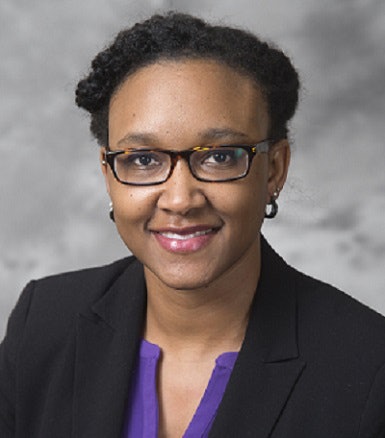Mentoring is paramount to the success of Black women pursuing graduate degrees. Unfortunately, mentors at predominantly White institutions (PWIs) who provide formal mentoring for Black women graduate students are few and far between. Consequently, women find themselves turning to informal mentors such as peers, other-mothers and family for the support and guidance they require.
Mentoring is a relationship in which a more experienced individual guides and advises a less experienced individual by providing instrumental and psychosocial support. Effective mentoring relationships are critical to Black women graduate students’ persistence and post-graduation success.
 Torrie Cropps
Torrie CroppsMentors provide instrumental support by supporting attendance to conferences, presenting publication opportunities, and connecting students with other scholars and students of color. Mentors provide psychosocial or emotional support by befriending the student, counseling the student, and helping the student develop self-confidence and a positive self-image.
Some Black women graduate students at PWIs may have what could be called a “board of directors” that consists of all of the individuals that these women identify as their mentors. Due to the lack of Black women mentors available in the academy, students turn to a number of mentors that include friends, other-mothers, family, and professional colleagues that can offer academic, career, and emotional support. As a Black woman graduate student attending a PWI, I can affirm that having a board of directors has enabled me to continue in my doctoral program. My campus sisters have provided a great deal of emotional support and friendship. My other-mothers have provided spiritual guidance and gentle scolding. Though I am hundreds of miles away from my family, they have ensured me they are only a phone call away.
A Black woman mentor who has already navigated a graduate program can guide and assist a Black woman graduate student on departmental and discipline-specific social norms, such as how to dress, how to navigate the political landscape of academia, and how to deal with stereotypes and micro-aggressions. Additionally, Black women mentors often offer emotional support through friendship and sisterhood. Black women have reported that they have a higher level of trust with a Black woman mentor. Black women mentors are believed to be more relatable, trustworthy, and understanding than White mentors, male or female. Black women often feel that they cannot truly express themselves with White mentors or show any weaknesses, whether academic or personal. Because of this shielding, Black women graduate students want Black women mentors that they can be their true selves with, confide in, and express themselves without being misunderstood or ridiculed.
Sisters, other-mothers, and aunties are informal mentors. Sisters are peers that tend to offer friendship and emotional support. Other-mothers are women who, on behalf of the Black community, go “above and beyond” in mentoring Black students. Quite often, Black women graduate students are the sole Black woman in their department. As such, these women tend to seek out alternative, or informal mentors. A friend once told me that if it were not for her peer mentors, she would not have finished her doctoral program. Many other peers at PWIs have expressed similar feelings: peers have helped them get through “dark” times, have helped them prepare for preliminary exams, and have been a shoulder to lean on. While pursuing my doctoral degree, I have found sisters and other-mothers in my university’s Black Graduate Student Association, in my academic department, and at the Black Cultural Center. Informal mentors can also be found in diversity offices, Greek-letter organizations, volunteer opportunities, and at church.
 Dr. Levon T. Esters
Dr. Levon T. EstersThough Black women faculty mentors are scant in number, there are strategies that Black women graduate students can take to help alleviate the stress of not having a formal mentor. Black graduate women must take initiative and build the community they want to see. This can be done by reaching out to Black women faculty, staff, and students in and outside of their own discipline. For example, Black women at my institution saw a lack of a sense of community among Black women on campus. The resulting organization, Mind, Body, and Soul, has brought together Black women undergraduates, graduate students, post-doctoral students, faculty, and staff from Liberal Arts, STEM, and everything in between. All of these women have a story to share. We uplift, encourage, and affirm each other. Additionally, Black women graduate students must create their Board of Directors. By being engaged in organizations such as Mind, Body, and Soul and Black Graduate Student Associations, we can find Black women who are eager and willing to serve as an informal mentor on the Board of Directors.
In the absence of support organizations, Black women faculty, staff and administrators must be willing to reach out to and advocate for Black women graduate students. This can include an invitation to lunch, coffee or a campus event. Knowing that there is a Black woman on campus that is willing to offer support can feel like a weight has been lifted off students’ shoulders. Further, supporting Black women graduate students in creating support organizations can be extremely helpful and can hopefully be a safe space for Black women for years to come.
Black women faculty and administrators must also communicate to campus administrators the importance of hiring and supporting Black women, as well as the importance of safe spaces for Black women graduate students. I urge Black women at PWIs to connect with other Black women on campus, create the safe spaces they need and to develop their board of directors. The Black women I have met while in graduate school and the women that have helped me along the way inspire me to do better and to be better as a sister-friend and as a scholar. A quote I often go back to is “I can’t stop now, someone is counting on me to finish strong.” Go help a sister finish strong.
Torrie A. Cropps is a doctoral candidate in the Department of Agricultural Sciences Education and Communication at Purdue University. Torrie’s research interests include the mentoring of Black women in STEM-based agricultural and life science disciplines, critical qualitative research, and the career development of graduate students in STEM. You can follow her on Twitter @ScholarCropps.
Levon T. Esters is an associate professor in the Department of Agricultural Sciences Education and Communication at Purdue University. Levon’s research focuses on the STEM career development of students of color, mentoring of women and graduate students of color in STEM, and the role of historically Black land grant institutions in fostering the STEM success of women and students of color. You can follow him on Twitter @Levon_Esters.















